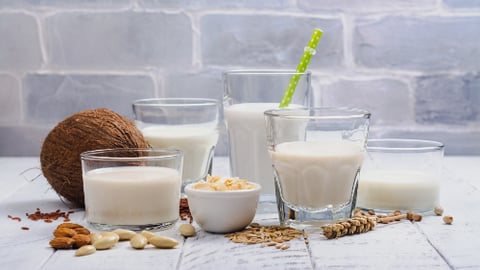Grocers Improve Sports Nutrition as Consumer Needs, Products Evolve
Key Takeaways
- Sports nutrition products continue to grow in popularity, particularly plant-based and protein-rich offerings.
- Manufacturers are moving beyond traditional powder, liquid and bar forms to introduce chips and cookies addressing both savory and sweet cravings.
- Grocers are getting better at merchandising such products, creating in-store destinations featuring a wider range of options and nonfood items like water bottles, mats and apparel.
As consumer demand for sports nutrition products grows, chains are finding ways to extend shelf space or are reorganizing the category to accommodate new entries and shifts in consumer preferences.
Plant-based products are still leading category growth, according to a recent report from London-based market research firm Euromonitor, a trend that’s fueled by increased consumer interest in becoming flexitarian, vegetarian or vegan for health reasons, and/or in support of the cruelty-free animal movement.
Protein Power
Protein-heavy, or Ketogenic, diets are particularly popular with core users of sports nutrition, with many users embracing them as part of their fitness goals to optimize their focus and body energy usage, according to a recent report from Euromonitor. The market researcher reports that innovative manufacturers, such as Franklin, Tenn.-based Ancient Nutrition, are meeting this demand with products such as Keto Protein Coffee and Keto Protein Chocolate.
“Retailers are definitely expanding their space in response to these consumer and category growth trends, particularly on the protein side,” affirms Ryan Therriault, VP of marketing and innovation at Newport Beach, Calif.-based Amazing Grass.
While Buyer Bryan Perry is limited by the space that he can give to the category at Rigby, Idaho-based Broulim’s, which operates 10 stores, he says that he continually adjusts his assortment.
He’s also seen collagen protein, a supplement for skin, bone and joint health, gain traction. “There is big growth in collagen,” Perry asserts. “I’ve added a number of new products in the past six months from Ancient Nutrition.”
“One of the biggest trends we are seeing is the explosive interest in collagen, particularly for its associated benefits regarding joint health and injury recovery,” says Therriault, while Karen Huh, VP of brand and product strategy at Bellevue, Wash.-based Bulletproof 360, notes, “Brands are finding lots of different ways to infuse collagen into new products, from coffee to water to protein bars.”
Amazing Grass recently launched Amazing Protein, a line of several plant-based protein products with reviving superfoods to help support collagen synthesis.
For his part, Kenny Braun, buyer at Breaux Mart, says that protein drinks are outpacing powders at the four-unit chain based in Metairie, La. “We’re continuing to move forward with the category as long as it’s growing,” he adds.
Digestive health claims are also emerging in sports nutrition products. Amazing Grass recently introduced Amazing Protein Digest, a plant-based protein with superfoods to help manage bloat and provide soothing digestive support, while Bulletproof has rolled out InnerFuel, a prebiotic supplement.
Beyond Powders, Liquids and Bars
Looking for new ways to deliver a protein boost to consumers, manufacturers have introduced a variety of protein-enhanced snacks. For instance, Wegmans includes Health Warrior’s Protein Mug Muffins, Quest Nutrition’s Protein Chips and Buff Bake’s cookies in a special 4-foot section, while Hy-Vee, Giant Eagle, Dierbergs, Demoulas and Big Y carry Quest products.
“Protein is an essential macronutrient, so consumers are increasingly seeking high-protein options beyond the usual powders, bars and liquids,” notes Suzanne Ginestro, chief marketing officer at El Segundo, Calif.-based Quest. “With our bars and cookies, we found ways to feed their sweet cravings. With the 2018 introduction of Quest Tortilla Protein Style Chips, we were able to expand our savory offerings.”
The company has added a Chili Lime Tortilla Style Protein Chip to its lineup as well as a new Spinach Mushroom Thin Crust Pizza. “We see many opportunities to expand into different foods with more snacking and meal options that deliver complete-protein, low-net-carb and low-sugar versions of popular foods,” Ginestro observes.
“We do quite well with protein tortilla chips, and I’m toying with bringing in protein cheese puffs,” says Broulim’s Perry.
Avoiding Confusion in the Aisles
A plethora of new products, however, can result in consumer — and retailer — confusion.
Fairfield, N.J.-based OWYN (Only What You Need), which markets plant-based protein shakes and powders, is among a growing number of manufacturers ensuring that their labels communicate their product attributes.
“OWYN’s recent messaging is ‘What’s Inside Matters,’ and we are reinforcing the cleanness of our label — no dairy, no soy, no egg — on POS, displays and digital campaigns,” asserts Mark Olivieri, VP of marketing.
“People are taking a closer look at what is inside each product they buy,” Bulletproof’s Huh concurs. “Our products’ packaging states when a product is non-GMO, gluten-free, organic, has no added sugar or has another unique quality.”
In-Store Destinations
Adjacencies can be important to the category. For instance, a ShopRite in Ramsey, N.J., locates a 4-foot set of Gaiam Wellbeing yoga accessories adjacent to the sports nutrition category, and Rochester, N.Y.-based Wegmans Food Markets includes Solgar nutritional shake powder in an end cap set that includes private label yoga clothing and water bottles and mats from Gaiam Wellbeing.
“We are seeing a few retailers, like Target, experimenting with dual placement of certain products in complementary adjacent categories,” says Therriault
Also crucial is making sure that shoppers get the information they need to make informed purchases. To that end, Wegmans employs signage (below) pointing out the different benefits of plant protein, whey protein powders, and collagen and ready-to-drink products to better organize its offerings and help consumers navigate the choices in the sports nutrition aisle.
The grocer also groups plant- and whey-based products together on promotional display tables in the center of the nutritional section, and uses the displays as another opportunity to educate consumers about the products.
Meanwhile, ShopRite of Ramsey, which devotes 7 feet to powders and drinks and 20 feet to bars, uses color-coded signage identifying product attributes (gluten-free, no sugar added, vegan and good source of calcium) on shelf tags in the sports nutrition section.
“If products are put in the wrong section of a store or displayed incorrectly, it could entirely change the messaging of the item. Supermarkets have been improving in this regard, creating entire aisles or shelves dedicated to supplements and sports nutrition products."
















